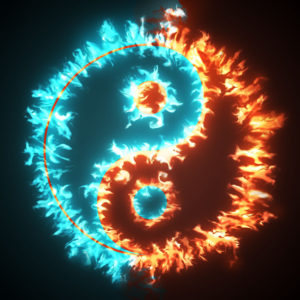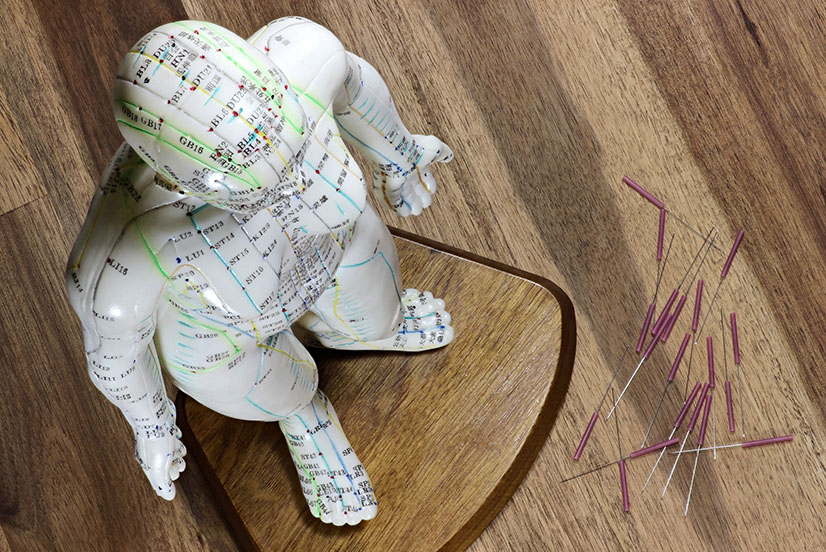 By Susan Tretakis – Coral Springs, Florida – People who follow me on Facebook know that when I check-in for my acupuncture appointment, I usually tag the location with a somewhat glib “Getting my Qi balanced”.
By Susan Tretakis – Coral Springs, Florida – People who follow me on Facebook know that when I check-in for my acupuncture appointment, I usually tag the location with a somewhat glib “Getting my Qi balanced”.
And just as usually, there is someone who sends me a text or Facebook message that bluntly asks, “What exactly are you talking about?”
Truly, the concept of Qi is much more than a cute, humorous one line tag; Traditional Chinese Medicine begins with the concept of Qi – which incidentally – if you did not know (I didn’t) – is pronounced “chee”.
Let’s start at the beginning – because – well, in a sense, it all begins with Qi.
After more than 3500 years of evolution, Traditional Chinese Medicine is now a sophisticated system of medicine which successfully treats as well as prevents a multitude of illnesses. Research has documented that various types of TCM have shown to strengthen ones immune system. People with strong immune systems recuperate and heal from illnesses and injuries faster than if their bodies are in a weakened state. Most importantly – at least to me – is that a strong immune system protects you from getting sick in the first place.
It is important that you understand that Traditional Chinese Medicine views the human body as a complex, self-contained system. TCM practitioners believe that the “system” (mind and body) affords one good health, well-being and resiliency when it is in “harmony”. In contrast, a system in “disharmony” tends toward illness, disease and suffering. Practitioners of Traditional Chinese Medicine strive to keep the systems of their patients in harmony. Each of the most known TCM treatments – acupuncture, cupping, Chinese herbology, dietetic recommendations or various types of massage – are each prescribed with one goal in mind: to keep ones’ Qi freely flowing, organ to organ, mind to body.
TCM defines Qi as the circulating force within ones’ body. TCM practitioners believe that each individual is a system comprised of everything that creates and sustains itself. It takes a bit of time for many of us Westerners to make this “mind shift” and see that everything is interconnected and interdependent. We are so used to identifying a symptom as a separate part of our body – our complexion is acting up, our hair is thinning or breaking, our back pain gets worse and so on – that we do not take into consideration the larger picture of how our the organs in our bodies may be causing these issues.
To fully see how this mind/body connection exists, all you have to do is watch television and see the commercials for the various types of headaches; within the hour you’ll see and hear advertisements for sinus headaches, headache associated with dentures, headaches due to muscle aches and so on. The same goes for stomach “disharmonies” or illnesses. Each of these symptoms may be the same – a headache or a stomach ache – but they all originate from somewhere else in your body. To a TCM practitioner, 5 people with the same gastro-intestinal complaints may result in 5 different treatments; that is how unique our individual Qi makes each of us.
I began acupuncture with a litany of complaints; none of which I felt were related, some of which I did not mention to my doctor at our first few sessions. I was depressed, suffered from mood swings and I was frustrated easily by the smallest of things. Each morning, after a previous evening’s rigorous dental routine known as “FBI” (flossing, irrigation, brushing) I would wake up with a bitter taste in my mouth. I was suffering from a severe case of “dry eye” requiring three types of eye drops on a daily basis. There were muscle relaxers, cortisone shots and pain pills for on-going knee, shoulder, and lower back aches. There were MRI’s taken – and re-taken – for vertigo and migraine headaches. There were sinus CT scans almost every six months.
It wasn’t that I was ignoring these things; it was the exact opposite. I became an expert in seeking out specialists. I was being actively treated utilizing conventional medical and dental recommendations. My concern was simple: given the time spent in medical offices and the money paid out for treatments, I was really not experiencing the type of recovery I expected.
But again, because I was convinced that most of these were all separate issues, I said nothing.
My acupuncturist is much smarter than I am; rather than let my list of complaints go silent, he began with a series of questions after examining my tongue and taking both pulses. When he asked whether my eyes were dry, did I have headaches or sinus issues, I realized that he was connecting what he saw with what I was experiencing. He asked so many questions – what specific foods did I eat, what type of exercise did I do, what prescribed medicines was I taking.
My doctor went on to explain to me that everything within my body is related – and everything ties back to my life force or vital energy – my Qi. If each part of my system is in harmony, then my entire body is in harmony. Disturb one thing and a disturbance is created that ripples throughout my system.
While I believed I had a fairly solid grasp on the “mind-body” connection, I have to admit I knew nothing of the relationship of the organs inside my body. I did not know the power of the liver, stomach or heart, or even the spleen, which in Western medicine is thought to be an unimportant organ. Not so in Traditional Chinese Medicine. In Traditional Chinese Medicine, the spleen is central to digestion. The spleen is thought to pull Qi from the foods we eat and deliver that to the rest of the body.
TCM pairs the stomach and spleen as sources for digestion. Because of a gastric bypass in 2005, I know I have I have less of a stomach than most, but my doctor explained the meridians – the nerve pathways – are still there. My spleen is more important to assist my less- than-whole stomach. In addition to treating me with acupuncture, my TCM practitioner also used a variety of other techniques, including Chinese herbology, recommendations for foods to eat as well as to avoid, as well as recommendations for physical exercise.
My acupuncturist told me I was suffering from “liver-qi-stagnation”. He explained that the Qi in the liver is thought to be largely responsible for the balanced movement of Qi throughout the body. When the liver Qi is stagnant, blood becomes stagnant. He also discussed “heart qi deficiency”, which he felt was responsible for my anxiety and restless sleep. I learned how the a Qi deficiency in my kidneys could be responsible for my thinning hair, my knee and back pain as well as those troublesome “senior moments”.
I saw and felt a difference within days. Others saw a difference as well. As time progressed, I saw other positive changes. Eventually, pain pills, eye drops, cortisone shots, antacids and so many other things became unnecessary. Over the past two years, there have been no further MRI or sinus CT scans. And then both my hairdresser and nail technician noticed changes for the better.
I became a believer. And as a believer, it became essential to do more research – and in my own way – spread the word.

A 2015 study published in the Journal of Traditional Chinese Medical Science outlines a variety of possible factors that can lead to a Qi deficiency as well as suggestions for nourishing ones’ Qi. While the authors suggest that there could be a link between Qi deficiency and aging (And why am I not surprised to see aging as part of this equation?), they also identify relationships between Qi deficiency and chronic medical diseases and related complications, such as heart disease, gastro-intestinal illness, hypertension or stroke.
In addition to these physical illnesses which negatively impact our Qi, I would include what I refer to as the continual “Qi-sucking” attributes of our daily lives. Family and workplace stress, too little downtime, and money concerns all take an emotional toll as does our reliance on and keeping current with the continual changes in technology. Care-givers are under enormous stress. Our ingrained link to social media – where we compare and contrast our lives with the lives posted by others – can quickly drain anyone’s energy. And then there is the randomness of life – when the dishwasher or washing machine floods your kitchen or the car needs unexpected repairs and we have no choice but to “deal with it”.
This is where a balanced and strong Qi can help one, quite simply, deal well.
Acupuncture, by definition, is a TCM practice which keeps the Qi moving throughout the body. Proper placement of the acupuncture needles relieve any blockages to the Qi. These blockages can translate into illness and injury. Qi is everything from the ability of our lungs to breathe healthfully to our stomachs digesting food. By treating the Qi, acupuncturists are really just trying to bring everything within the body to a proper, balanced state. Most people report a sense of relaxation and peace after an acupuncture treatment; what they are actually experiencing is one of the benefits of a balanced Qi.
So, yes, I want my Qi to be balanced so I can benefit from maximum physical and emotional health. I want my Qi strengthened so I no longer suffer from the illnesses – aka symptoms – treated with pills and surgeries recommended by conventional medical practitioners. I do not want any of the problems that a general, or organ-specific Qi deficiency, can cause.
Just as importantly, I want my Qi strengthened to protect my mind and spirit. I want to be able to handle what life throws at me each and every day. By my age, I know there is little I can control in life; all I can do is control how I react. Balancing my Qi makes me more resilient, able to handle what needs to be handled and to dismiss what may be simply an errant event or comment.
So, yes, there were foods I needed to eliminate, but there were foods I tried for the first time. Yes, I needed to become more informed about what was added to food; and yes, surprisingly, I needed to learn how to cook. There were types of exercise I needed to weave into my life. There was the innate responsibility given to me by my doctor to nurture and care for myself. I needed to be aware how my lifestyle choices would affect my health, prevent illness and extend my longevity.
Life, it is said in the Chinese medical classics, is simply a gathering of Qi. If a strong Qi makes for a healthy and happy human being that is both a dynamic and harmonious mixture, for me, these are very easy choices to make.
Schedule a free consultation to get your Qi checked with one of our skilled, licensed physicians serving the local communities of Margate, Coral Springs, Coconut Creek and Parkland Florida.
Sources:
- Dr. Landon Agoado, Care Wellness Center
- https://www.takingcharge.csh.umn.edu/explore-healing-practices/traditional-chinese-medicine/what-qi-and-other-concepts
- https://en.wikipedia.org/wiki/Qi
- https://www.medicalnewstoday.com/articles/321841.php
- https://www.sharecare.com/health/mind-body-therapies/qi-in-traditional-chinese-medicine
- https://www.verywellhealth.com/liver-qi-stagnation-89974
- https://www.beliefnet.com/wellness/health/2003/05/balance-your-chi.aspx
- https://www.consciouslifestylemag.com/qigong-exercises-healing-energy/
- https://www.healthline.com/health/qi-deficiency#symptons
